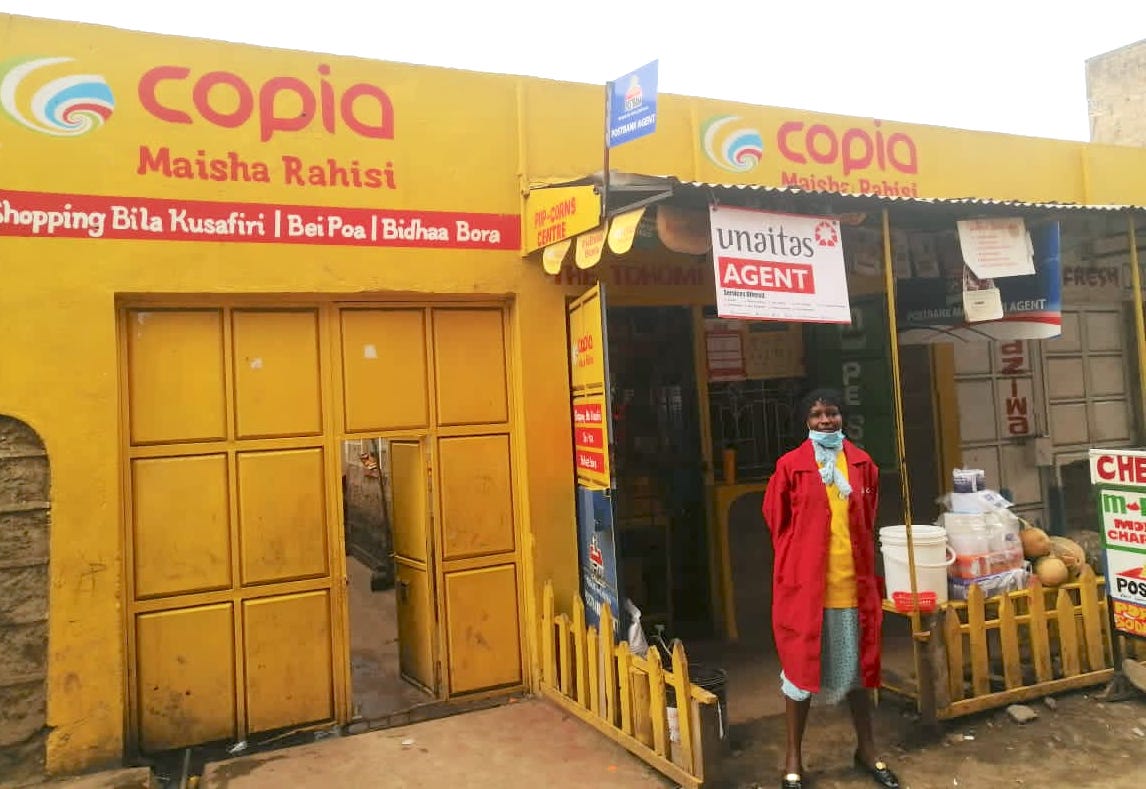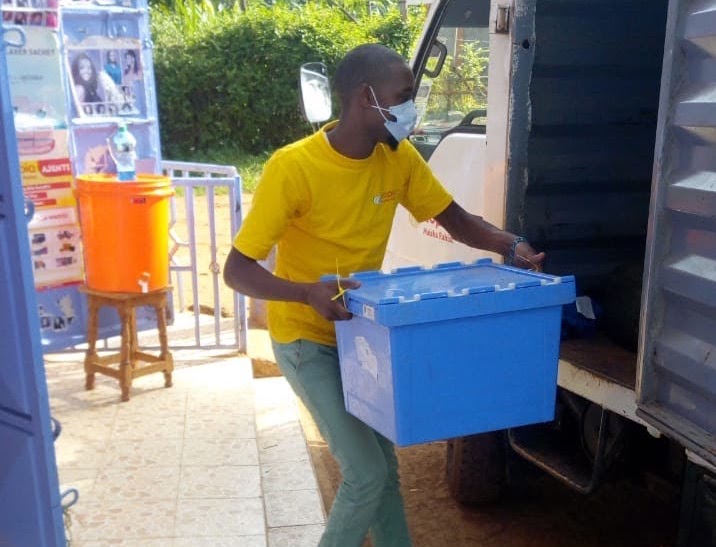Copia – Delivering to Kenya’s under-served people
This Kenyan social enterprise has just won a $5m investment from the US government to scale up its work which is turning the African e-commerce market on its head.
On an unpaved street in Githurai 45, a semi-rural neighbourhood about an hour’s drive from Nairobi, Jane’s shop displays a bright yellow front, contrasting with the dark grey clouds in the Kenyan sky. There aren’t many people around, and everyone is masked up – Covid-19 rules. After making her way behind the counter, Jane uncovers her face, revealing a big smile.

Jane is a chemist. But for the past two years, she has also been selling mattresses, electronics and stationery, among hundreds of other products. “It’s like carrying the whole supermarket,” she says.
Jane, who was speaking to Pioneers Post via video call towards the end of 2020, is an agent who distributes products for Copia Global, an e-commerce retailer that sells affordable goods to middle and low-income communities in Kenya.
https://www.pioneerspost.com/news-views/20210322/copia-global-delivering-kenya-s-under-served-people
Founded in 2013, the social enterprise has, to date, provided approximately 1m unique customers with low-cost, high-quality products which they wouldn’t have been able to access otherwise. The enterprise has been widely celebrated, for example, it was listed in Fast Company’s 10 Most Innovative Companies in Africa for 2020. And it is in the process of scaling up – it received a US$5m equity investment from the US International Development Finance Corporation in the autumn of 2020, which followed $26m from several investors the previous year, and it is currently raising more.
One of its first investors, Elena Casolari, managing director of impact investor OPES-LCEF, says her team recognised the founders’ ambition: “We believed in what the founders envisioned: a solution that could disrupt an unfair status quo, shape a new narrative and give dignity to the have-nots.”
- Read more about Elena Casolari’s reasons for investing in Copia Global: ‘We invest in solutions that are still being moulded into shape’
Across Africa, 750m middle and low-income consumers are spending US$680bn every year, according to Copia’s estimates. Yet many remain forgotten by retailers who instead focus on Africa’s elites and middle classes, and are missing out on products which they see advertised but remain out of reach, whether it is because of geographical or economic barriers.
Western-style e-commerce platforms, such as Jumia, only target high-income consumers in well-connected areas with top of the range products. Meanwhile, bricks-and-mortar supermarkets do not have the logistic or economic means to reach rural and isolated populations.
Solving this distribution problem was the aim of American social entrepreneurs Tracey Turner and Jonathan Lewis when they co-founded Copia Global eight years ago. Turner had spent some time studying in Kenya in the mid-1990s, and saw first-hand that many people struggled to access quality goods. She went on to become a successful entrepreneur in Silicon Valley, and later came back to the country with the idea of reinventing e-commerce to deliver quality, affordable goods to low and middle-income consumers wherever they were, taking a purpose before profit approach.

Above: a driver makes a Copia delivery to an agent (photo courtesy of Copia Global)
“These consumers are really underserved,” Copia Global CEO Tim Steel tells Pioneers Post. “The traditional way of doing business doesn’t really work for a consumer whose aspirations and knowledge of what is available is getting greater and greater, but access to that is just not changing at all.”
Steel calls the way Copia operates “assisted e-commerce”. The company partners with a network of agents, usually local small business owners, like Jane, in remote or hard-to-access areas. Customers can visit their local agent and order directly from them. The goods are then delivered to the agent, where they can be picked up.
This process enables customers to receive goods locally without the need to travel to a supermarket or a town centre, which can be costly and take time. It also helps those who can’t buy online themselves because they do not have a bank account or internet access. While internet penetration in Kenya is increasing fast, “most of our consumer base fundamentally is still offline”, says Steel.
Most of our consumer base fundamentally is still offline
At Copia, being flexible is key to reaching as many people as possible. Some customers prefer browsing through a catalogue, others will choose to use the agent’s tablet, some might have an internet connection and order through Copia’s website directly. Customers have the option to connect to Copia in WhatsApp groups and an SMS service is also available. And while mobile money has become ubiquitous in Kenya, for low-income families, cash is still the cheapest option, so it is important that Copia accepts this type of payment too, Steel explains.
“We look at everything we do through the customers’ eyes,” says Steel.
It began with a pick-up truck
It all started with a small experiment, with Copia Global’s founding CEO, Crispin Murira, parking a pick-up truck in his parents’ garage and delivering goods to one or two agents himself.
The social enterprise now employs more than 400 people permanently in administrative and operational roles, and 226 casual workers, either working in the warehouses or driving delivery vehicles. It now has a network of about 25,000 agents across Kenya – five times as many as last year – which have processed more than 5m orders. While not directly employed by the company, agents earn a commission and their businesses – usually small village shops – benefit from increased footfall.
Jane explains she now runs a double business, which has been very positive economically. Traffic to her pharmacy has doubled, paying bills is no longer an issue, and she is even thinking of hiring another member of staff as she has become so busy.
Activity has been rising since the start of the Covid-19 pandemic, as more consumers are turning to deliveries to avoid contact with people in public transport and busy marketplaces. And at the outset of the pandemic, Copia was quick to anticipate the demand for household cleaning products and antibacterial gel, and was ready to deliver when people asked for them.
“During this time, the ‘corona era’, businesses were dying and closing down,” Jane says. “But I was sailing high because I was able to provide all that people couldn’t get in the market, the supermarket or in the town, thanks to Copia.”
Copia Global buys products from Kenyan suppliers as much as possible, and, if necessary, imports directly from manufacturers abroad, without using intermediaries with the aim, it says, of making sure Copia-branded products are always synonymous with quality. “Consumers are now really associating the purchase from Copia with a quality product,” Steel says, adding that in surveys, customers always mention quality as the first reason why they choose Copia.
I’ve seen people buy mattresses, buy bedding, things that these people could never have owned before
Shortening the supply chain lowers costs by removing the “middle-man”, keeping prices low for the consumer, Steel explains. Using a network of agents, instead of single-customer deliveries, also enables Copia to optimise and reduce the costs of transport.
The company intends to expand beyond Kenya, while always focusing on the “double bottom line” and keeping impact at the heart of the business model. Copia’s original mission is also key to customer loyalty.
“Impact is a prerequisite to having a relationship. It’s just fascinating to see how it works, this ecosystem between our agents, our customers, our transport suppliers,” Steel says.
Jane says she is proud of making a difference in her community. “I realised that most of the families were using plastic cups only, because they had no opportunity to have their own glasses, and to buy other household utensils,” she says. “So since I brought the Copia products to them, they have been able to get their own cutlery. I’ve seen people buy mattresses, buy bedding, things that these people could never have owned before.”
